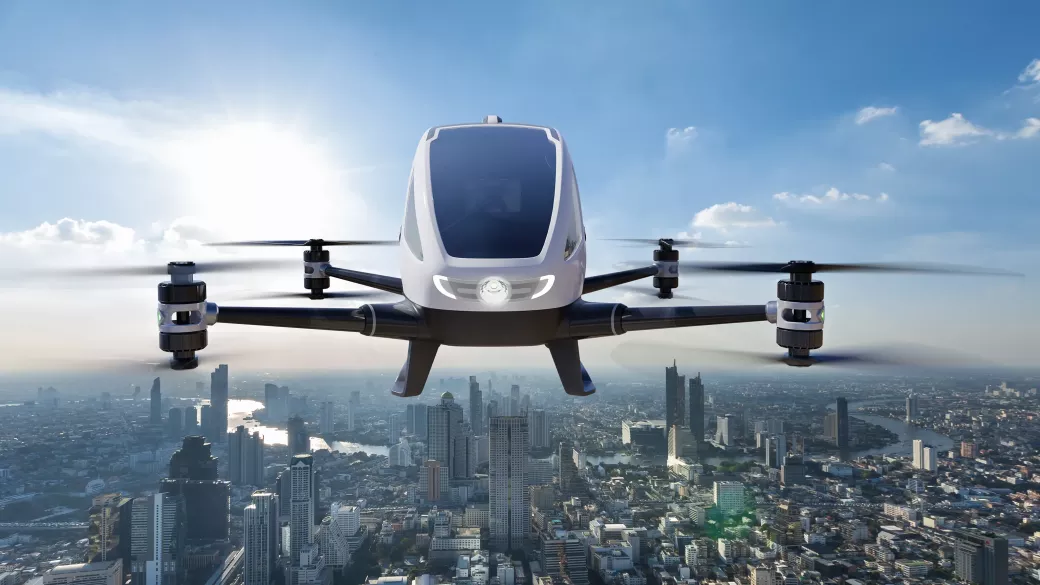
Empowering the transition to lighter, cleaner and safer movement in the skies, and beyond.
The Aviation and Aerospace industry is aiming to launch a new era of flight by transitioning from today’s jet power to tomorrow’s electric powered aircraft. This vision boasts many potential benefits, including lower fuel and maintenance costs, decreased air and noise pollution. It also brings unique challenges, particularly regarding the size, weight and energy density of batteries needed to enable electrically powered aircraft. Albemarle is conducting novel materials research to help the vision of e-mobility in the air become reality.

Lithium for Electric Flight
By working to engineer lithium for the higher-performance use required in aircraft propulsion models, Albemarle innovations can help the entire category of e-Mobility vehicles – including cars, boats and aircraft – go farther, charge faster and work longer. Some examples of promising new applications include:
- Enabling solid- and semi solid-state battery technology with advanced battery materials
- Engineered lithium-metal anodes to expand energy density +30%
Full scale commercialization of eVTOLs and expansion of the electric aircraft market segment potential will require energy density greater than the current 300 Wh/kg standard.
- 400 Wh/kg
- eVTOL urban air mobility
- 500 Wh/kg
- Hybrid-electric regional and short-range 150 passenger aircraft
- >700 Wh/kg
- Single aisle, long range 150 passenger aircraft

Urban Air Mobility: eVTOLs
The Electric Vertical Take-offs and Landings (eVTOLs) necessary for urban air mobility carry a much higher power demand – approximately 2-3x peak power for as long as 90 seconds – than ordinary EV car batteries currently supply. To meet this need will require a more efficient use of energy and a higher battery energy density – both challenges that Albemarle has been making progress towards solving.
Aircraft Structures
Aircraft manufacturers are increasingly turning to lighter and stronger lithium-containing alloys for their strength, durability and lightweight properties. Lithium aluminum alloys containing 1-3% of the weight of lithium are used in fuselage, fuselage beam, lower wing and upper wing structures. These materials can generate weight savings of 5%, increased stiffness up to 7%, and increased strength of up to 30% relative to conventional non-lithium containing aluminum alloys.
Related
Aircraft Components
Modern aircraft features anywhere from 70 to 300 miles of wire and cable as well as growing amounts of advanced polymers for various components. Aerospace manufacturers can benefit from Albemarle fire safety solutions, which are intended to meet stringent flame retardant standards to protect wire and cable, polymer components and even textiles. Navigators and passengers can fly with increased comfort that their aircraft is better protected from smoke and fire hazards.
Related
Precision Cleaning
Sensitive materials – such as complex circuit boards, optical equipment, aerospace and automotive parts – benefit from Albemarle’s high-performance cleaning solvents, which are intended for a variety of vapor degreasing, cold and ultrasonic cleaning applications. Our solutions are low Global Warming Potential and low Ozone Depletion Potential and are compatible with metals to reduce the risk of corrosion, making them ideal for cleaning delicate components in electronics, medical devices and precision engineering.
Related
Printed Circuit Boards
Albemarle’s flame retardant solutions are essential for the wiring and electrical connectivity required in circuit boards used in aviation and aerospace environments. In addition, our high-performance precision cleaning solvents are used for circuit board vapor degreasing, cold cleaning and ultrasonic cleaning, and are easy to recycle, compatible with metals and less likely to cause corrosion than many other solvents.